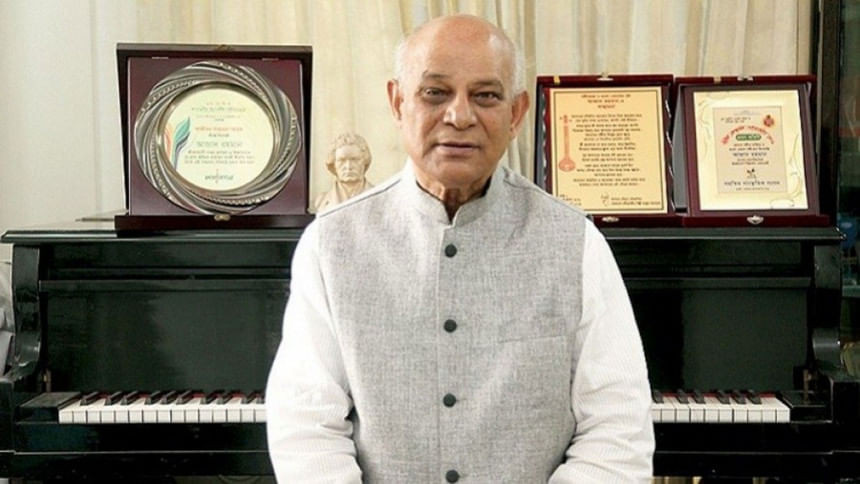Azad Rahman: A star in the musical firmament of Bangladesh

While highlighting the significance of music in human life, Martin Luther, the German theologian and leader of the Protestant Reformation, once said: "Music can make the sad merry, the merry sad… Make the proud humble…" Humble yet versatile, Azad Rahman, a legendary figure of music in Bangladesh who is considered the father of Bangla Kheyal, passed away at a hospital in Dhaka on May 16, 2020.
Born in West Bengal in 1944, Azad studied Indian Classical Music at the Rabindra Bharati University, Kolkata from where he received a gold medal. He migrated to Dhaka in 1964, and began working as an artist and music director in then Radio Pakistan. From there, he began to earn popularity as a composer, working on various songs mostly composed by Jebunnesa Jamal, Abu Haider Sajedur Rahman, Azizur Rahman, Dr Moniruzzaman, Rafiquzzaman, Dr Moniruzzaman, and Fazle Khuda.
Azad earned praise for his originality in crafting tunes, not comparable with that of any other composer. Besides his musical talent, he was also quite well known for his administrative capability. He served as a principal of the Government Music College, and also as the director general of Bangladesh Shilpakala Academy for two terms. Earlier, he was appointed the first executive director of the (now defunct) National Academy of Performing Arts. As Director General at Bangladesh Shilpakala Academy, he produced a cultural troupe for representing Bangladesh abroad through music. He led a number of cultural delegations to a number of countries. It was because of his committed mentorship that we got talented artists like Firoza Begum, Sabina Yasmin, Ferdausi Rahman, Ferdous Ara, Khurshid Alam, Runa Laila, Shahnaz Rahmatullah, Anjuman Ara Begum, Nashid Kamal, and others.
He displayed a remarkable zeal and commitment through the music direction of a number of patriotic songs such as "Songram cholbe, cholbey…" He was totally committed to the Liberation War in 1971, and during that critical time he composed songs like "Jonmo amar dhonno holo maago" to inspire the Freedom Fighters. He was in charge of music direction in a few movies including Agantuk, Dossu Bonhur, Ananto Prem. Also, he sang a playback song in the movie Epar Opar. Thus I have reasons to be fond of his music since 1966. I have been listening to the songs of Khursid Alam, Zinat Rehana, Khondoker Faruque Ahmed—"Tomar duhaat cchuye shopoth nilam", "Shonibar shonibar shonibar aaj", etc. These popular songs were tuned by Azad Rahman.
Azad was a regular participant in musical interview programmes on television where he used to impart lessons in a soothing tone and always appear with a smile across his lips. On December 31, 2019, Channel-i sponsored an exclusive programme of Bangla kheyal where he taught the audience the core points of kheyal. Apart from music direction, Azad used to give lecture on music and musical theories at private universities.
Diversity was his forte. One unique feature of his musical genius is that he had, unlike many famous composers of both Bangladesh and West Bengal, the remarkable skill of mixing the nuances of kheyal, gazal, and Lalon giti in the same song. Melody and simplicity were the dominant traits of Azad's tune. In 1977 and 1993, he was awarded twice the national prize as Best Music Director.
Another rare feature of his personality was that he could create "fusion" not just in the cultural life, but also in social life. He was an ideal husband, an affectionate father. The romantic song sung by his life partner Seilna Azad, "Moneri rongey rangabo," was extremely popular to the lovers of music. He used to help his wife in the kitchen. As an intimate friend and admirer of his music, he once invited me to dinner and claimed that a few vegetable items on the menu were prepared by himself. I saw him last in 2018 at a musical soiree, held on the Green Herald School campus, and I again met the couple at Bangabhaban the same year on the occasion of the Victory Day. He was a very humble man but he would not tolerate any debate on the validity of Bangla kheyal to which he was exceptionally dedicated.
Every song contains a melody that lingers in the minds of all, young or old. Experts in communications and music agree that music makes pleasurable sounds that communicate a message to our inner being. Azad Rahman will be remembered for his melody, simplicity, originality, and diversity. His songs will continue to inspire both the present and future generations of Bangladesh and beyond.
Dr Syed Naquib Muslim is a former secretary of the government of Bangladesh.

 For all latest news, follow The Daily Star's Google News channel.
For all latest news, follow The Daily Star's Google News channel. 



Comments